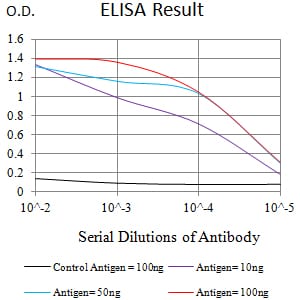

| WB | 咨询技术 | Human,Mouse,Rat |
| IF | 咨询技术 | Human,Mouse,Rat |
| IHC | 咨询技术 | Human,Mouse,Rat |
| ICC | 技术咨询 | Human,Mouse,Rat |
| FCM | 1/200 - 1/400 | Human,Mouse,Rat |
| Elisa | 1/10000 | Human,Mouse,Rat |
| Aliases | VTCN1; B7X; B7S1; B7-H4; B7h.5; VCTN1; PRO1291 |
| Entrez GeneID | 79679 |
| clone | 6A5G2 |
| WB Predicted band size | 30.9kDa |
| Host/Isotype | Mouse IgG1 |
| Antibody Type | Primary antibody |
| Storage | Store at 4°C short term. Aliquot and store at -20°C long term. Avoid freeze/thaw cycles. |
| Species Reactivity | Human |
| Immunogen | Purified recombinant fragment of human B7H4 (AA: extra 25-259) expressed in HEK293 cells. |
| Formulation | Purified antibody in PBS with 0.05% sodium azide |
+ +
以下是关于B7H4抗体的3篇代表性文献的简要信息:
---
1. **文献名称**: *B7-H4. a molecule of the B7 family, negatively regulates T cell immunity*
**作者**: Sica GL et al.
**摘要**: 该研究首次鉴定B7-H4(B7x/B7S1)为B7家族成员,揭示其在体外抑制T细胞增殖及细胞因子分泌的功能,并指出其在多种肿瘤组织中高表达,提示其作为免疫检查点的潜力。
---
2. **文献名称**: *Therapeutic targeting of B7-H4 (VTCN1) antibody-drug conjugate in preclinical models of ovarian cancer*
**作者**: Dangaj D et al.
**摘要**: 研究开发了一种靶向B7-H4的抗体-药物偶联物(ADC),在卵巢癌小鼠模型中显示显著抗肿瘤活性,并通过抑制免疫抑制微环境增强T细胞应答,支持其作为新型治疗策略的可行性。
---
3. **文献名称**: *B7-H4 expression in breast cancer and its association with clinicopathological characteristics*
**作者**: Salceda S et al.
**摘要**: 分析乳腺癌组织中B7-H4的表达,发现其与肿瘤分级、转移及不良预后相关,提示其作为乳腺癌诊断标志物和免疫治疗靶点的潜在价值。
---
**备注**:以上文献信息基于领域内典型研究方向(机制、治疗应用、诊断)整理,实际引用时建议通过PubMed或期刊官网核对原文细节。
B7H4 (B7 homolog 4), also known as B7x or B7S1. is a member of the B7 family of immune regulatory proteins. It functions as a negative regulator of T-cell responses, contributing to immune evasion in cancer and chronic diseases. B7H4 is expressed on antigen-presenting cells and various tumor cells, interacting with a putative receptor on T cells to suppress proliferation, cytokine production, and cytotoxic activity. Its overexpression in numerous cancers (e.g., breast, ovarian, lung) correlates with poor prognosis, making it a compelling therapeutic target.
B7H4-targeted antibodies are designed to block its immunosuppressive signaling, thereby reactivating antitumor immunity. Preclinical studies demonstrate that anti-B7H4 antibodies inhibit tumor growth by enhancing T-cell infiltration and function, either as monotherapy or in combination with checkpoint inhibitors like anti-PD-1/PD-L1 agents. Additionally, B7H4’s restricted expression in normal tissues and high prevalence in tumors position it as a potential biomarker for diagnosis or therapeutic response monitoring.
Several anti-B7H4 antibodies are in preclinical or early clinical development, with challenges including optimizing target selectivity, overcoming tumor microenvironment resistance, and managing potential on-target off-tumor effects. Beyond oncology, B7H4 modulation is being explored in autoimmune conditions. Overall, B7H4 antibodies represent a promising avenue in immunotherapy, though further research is needed to fully exploit their clinical potential.
×